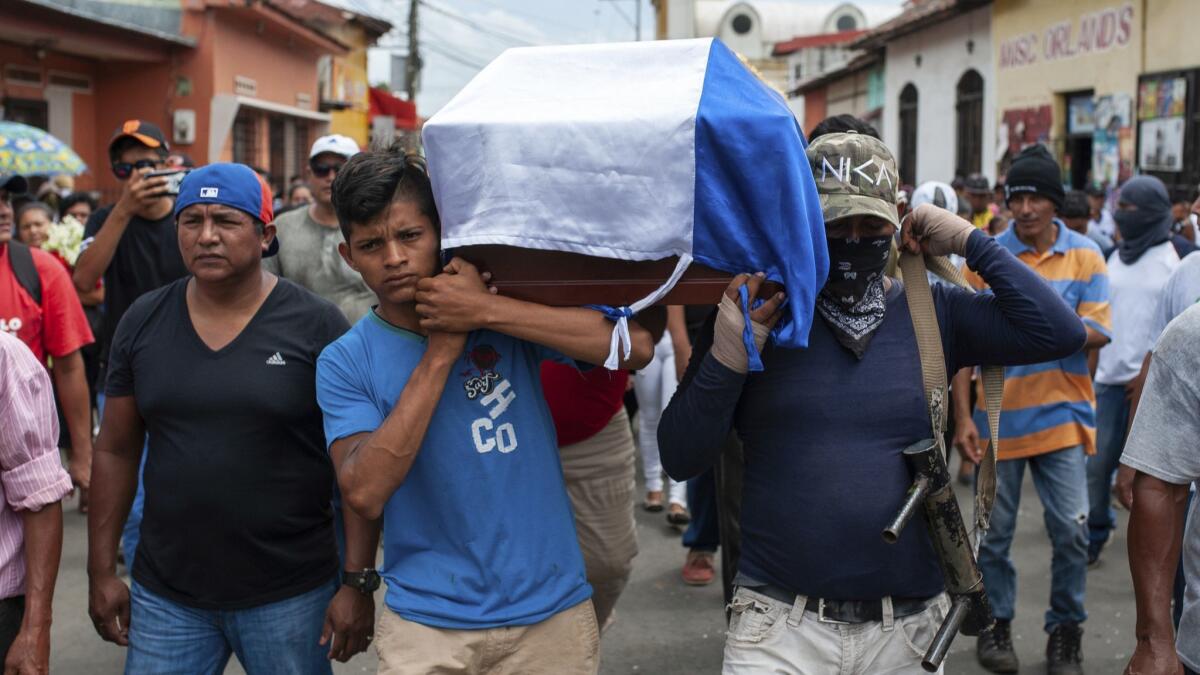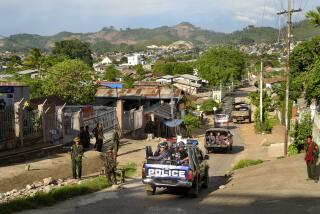Nicaragua forces violently retake symbolic city

- Share via
Reporting from MANAGUA, Nicaragua — Nicaraguan national police and armed pro-government civilians laid siege Tuesday to and then retook a symbolically important neighborhood that has recently become a center of resistance to President Daniel Ortega’s government.
Government forces began advancing on the Monimbo neighborhood of Masaya city before dawn and had largely regained control of it by the afternoon for the first time since massive protests against Ortega’s government began in mid-April.
Youths fired homemade mortars from behind barriers of stacked paving stones pried from streets lined by single-story homes and artisan workshops in the town about 16 miles southeast of the capital, Managua.
But they were overwhelmingly outgunned by government loyalists who within hours had advanced to the heart of the neighborhood and began posting videos on social media of themselves firing semiautomatic rifles into the air in celebration.
Alvaro Leiva, director of the Nicaraguan Pro-Human Rights Assn., said Tuesday that there were preliminary reports of three people killed in the fighting and dozens wounded. There were also widespread reports of youth hauled away by pro-government fighters.
The same neighborhood’s residents rose up against strongman Anastasio Somoza in the late 1970s as part of the Nicaraguan revolution led in part by Ortega himself. But since protests against cuts to the social security system in mid-April became a broader call for Ortega to leave office, Monimbo has again become a center of the opposition.
Ortega’s government has dismissed opponents as delinquents attempting a coup d’etat and wants to quell unrest in Masaya before Thursday, which marks three months since the start of protests across Nicaragua. Thursday is also the 39th anniversary of Liberation Day, which marks the overthrow of the Somoza regime in 1979 by the Sandinistas.
Nicaraguan Vice President Rosario Murillo, who is Ortega’s wife, said Monday that it was necessary to “clean” Monimbo and Masaya. She described the opposition as “coup plotters, few in number, malignant, sinister, diabolical, satanic and terrorists.”
Masaya’s police commissioner struck a similarly combative tone.
“The population of Masaya, the population of Monimbo, has asked us to free them from the delinquents and terrorists that have them trapped with their deadly barricades, and we’re going to do it at any cost,” said commissioner Ramon Avellan.
Gangs of armed men dressed as civilians appear to be working in coordination with police to remove roadblocks set up by the opposition that have snarled the country’s traffic for months. Heavy machinery was brought in to clear streets Tuesday.
Last weekend, government-allied forces retook the National Autonomous University of Nicaragua campus in Managua, where students had been holed up.
With gunshots echoing in the background Tuesday in Monimbo, a woman who asked to be identified only as Silvia out of safety concerns said she treated wounded victims in a makeshift field clinic.
Silvia, a member of the April 19 resistance movement, said youth were fighting with homemade mortars to defend the roadblocks erected at the neighborhood’s perimeter, but government forces were heavily armed.
“We need the [Organization of American States], the international organizations to stop this massacre,” Silvia said. “We’re fighting for democracy, for freedom.”
Several hours later she said that pro-government “paramilitaries” had control of a good part of the area and that the opposition had fled into the surrounding woods. “Their firepower doesn’t compare with our homemade weapons.”
Police roadblocks prevented journalists from entering Monimbo.
Managua’s auxiliary Roman Catholic bishop, Silvio Jose Baez, said via Twitter that bullets in Monimbo entered the Maria Magdalena parish where a priest was sheltering inside.
The government says more than 200 people have been killed since the unrest began, but independent rights groups say the number is higher.
On Tuesday, the United Nations human rights office spokesman Rupert Colville said, “The appalling loss of life must stop — now.”
“The violence is all more horrific as armed elements loyal to the government are operating with the active or tacit support of the police and other state authorities,” he said.
UPDATES:
5:15 p.m.: This article was updated to report that government forces had retaken the Monimbo neighborhood of the city of Masaya, Nicaragua.
This article was originally posted at 2:50 p.m.
More to Read
Sign up for Essential California
The most important California stories and recommendations in your inbox every morning.
You may occasionally receive promotional content from the Los Angeles Times.










